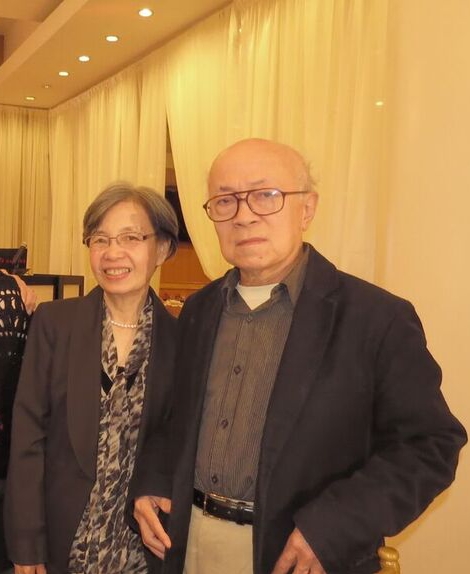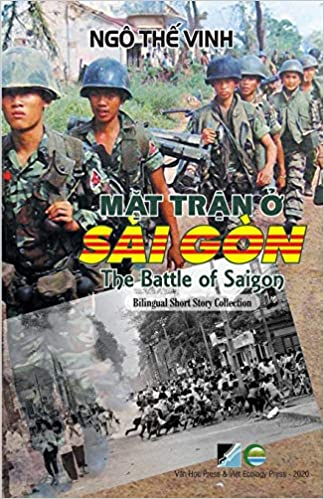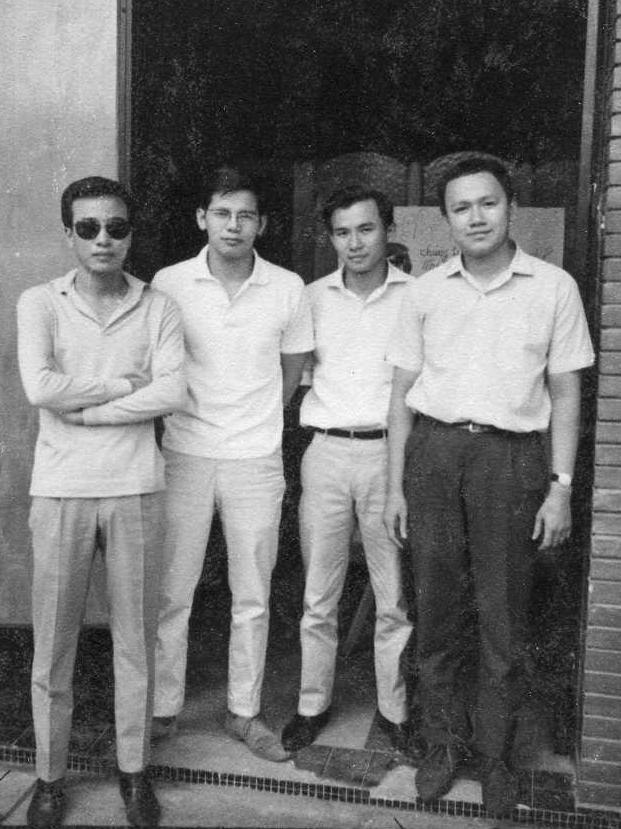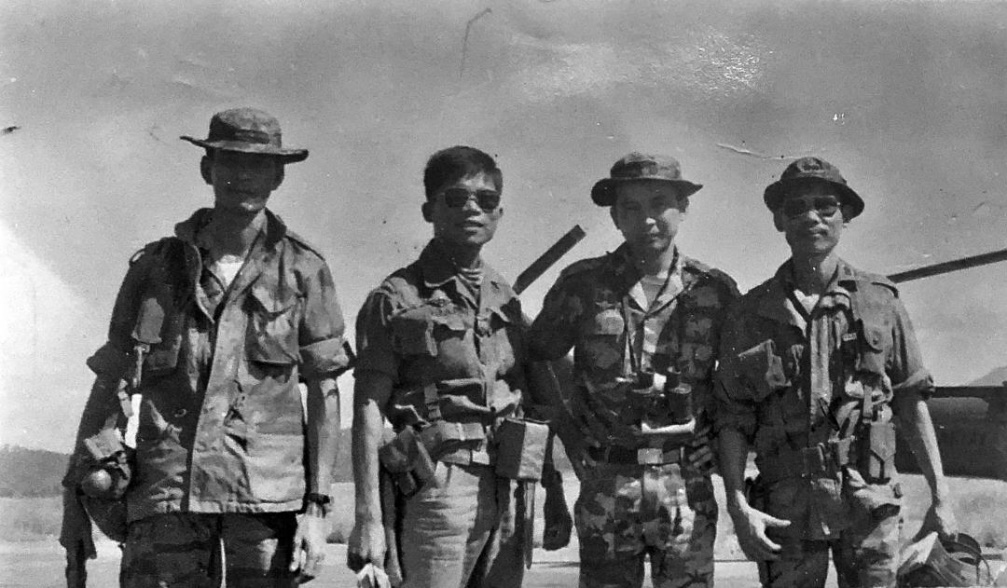“THE BATTLE OF SAIGON”
Hoàng Ngọc Nguyên

Mr. & Mrs Hoàng Ngọc Nguyên
Nguyen Hoang, educated in Saigon’s National School of Public Administration, Oxford University and the University of Utah, was an economist working with the Ministry of Economy of Saigon and also a journalist with the English-language Saigon Post before 1975. After immigrating to the U.S. in 1995, he had worked with the Marriott Library (UOU) until retirement in 2010. However, he still believes he has a mission to better the understanding of his readers about the history and politics of the “country of immigrants”.
(This is the English version, rather than the English translation, of a similar article in Vietnamese. To work out on an English version is much harder, and easier, than the English translation).
HOÀNG NGỌC NGUYÊN:
“The battle of Saigon” is a must-read for Vietnamese Americans of younger generations who can hardly read Vietnamese and have negligible historical understanding of why and how they or their parents happened to be in this country. Ngo The Vinh, the book’s author, was a chief physician of a Special Force regiment of the South Vietnamese army, the duty of which was to stop the infiltration of North Vietnamese troops into the south through “the Hochiminh trail”. Their fierce battles were mostly in the mountains and woods bordering the country. Vinh witnessed the merciless deaths of thousands of South Vietnamese soldiers and many more of the other side in search-and-destroy battles to hunt each other in these sinister areas. He also could learn how the poverty-stricken Vietnamese people in these distant mountainous areas could survive miraculously the daily threats of the murderous war. But the author’s greatest obsession was that the real and decisive battle of the war, ironically and stupidly, was “the battle of Saigon”, where the military-controlled government irresponsibly failed in its duty to lead the nation in war time, the politicians of both sides (enemy-manipulated “left” as well as sycophant “right”) ignorantly together destroyed the fragile system, religious leaders played into the hands of non-religious communists in the north, and the intellectuals were completely of no use as the “light” to the desperate people... As we have sorrowfully seen, it’s this battle which decided who won the war – after President Nixon pulled out U.S. troops in the course of “peace without honor”.

In these desperate days of self-confinement at home with no term in sight to thwart the murderous scheme of the worst invisible enemy besieging everywhere, “The Battle of Saigon” has become a great help to set aside the threat of this pandemic. In fact, the COVID-19 has painted a bleak picture of the vulnerability of mankind; the specter of recession is now compounded by inflation, with no end in sight, and we can really do nothing about it; and worst of all, the collapse of American democracy prevailing in the death of a Supreme Court justice, is a very persuasive evidence of the fragility of our political system...
Against such a saddening picture of this era of stupidity and the silent death of the American Dream is the re-emergence of “The Battle of Saigon”, which is shedding some lights from the past in order that we stay alive at present with the daily Trump Apocalypse... ... Such stories taking place no less than half a century ago in a place which now seems so sorrowfully distant all of a sudden resurged in a lingering way in the memories as well as in the hearts of each of us once we have the “Battle of Saigon” at the night table.
This is a collection of short stories, and the 2020 edition is a bilingual Vietnamese-Englsih product. Many of the stories sound like a series of narratives from various battlefields which remind us of Ernest Hemingway’s “Farewell to Arms”. The only difference between the two is that “The Battle of Saigon” is a real account, exposing a lot the pain of our generation, the one living in such an era. We mostly were only in the twenties or early thirties at the time. Alas! Now all of us are already in the seventies – some even older. How can time fly by so fast?
A short story more or less is a fabrication (story), depending on what the writer wants to convey. Therefore, the story may sound unreal, and a reader can shrug the shoulders after reaching its end. A narrative, on the other hand, would collect notes, remarks, pensive thoughts, such feelings like sadness or delight, joy or anger of the writer aroused from his real life experiences. To an author like Ngo The Vinh, who since childhood could already learn the early lessons of freedom-seeking migration from the north to the center and finally the south of the country; who was schooled from the well-famed Khải Định (named after a king), Huế, to no-less-prominent Chu Văn An Highschool (Saigon) and the Medical School; and who spent years serving as a medical physician in the front line of the remotest and bloodiest battlefields in the Trio-Border of Vietnam-Campuchia-Laos until the fall of the nation... his life alone is abundant enough without the loan of any imagination.
Narrative reports are probably the most suitable style for Ngo The Vinh. He had enough pride and confidence in himself to speak up and find ways to express what he had witnessed and share his judgments and remarks that listeners and readers could accept. On the other hand, he also had the necessary humility of a person who understood the human helplessness in confronting "immense sufferings" in life that "Buddha’s Tears" only turned helpless the pitiful and grievous human "karma".
Many Saigonese in the latter years of 1960s knew the Saigon Medical School's Tinh Thuong magazine of its students. The press circle at the time was more or less chaotic and depressing, but Tinh Thuong was not a "commercial product", and it could attract readers interested in a magazine that enlightened human values, something that seemed to be lost in a life full of risky uncertainty. Ngo The Vinh used to be on the editorial board, a secretary general and an editor of this magazine, a bridge for future doctors to a society that truly had faithful respect for "the holy motherhood of doctors". Certainly, Ngo The Vinh had great beliefs and passions to dedicate himself to the creation of Tinh Thuong, and it was Tinh Thuong in exchange that helped guide him throughout his life to reach the poor people who were neglected in society, or those soldiers on the battlefields who were rarely remembered by the people behind.
"The Battle of Saigon" is a collection of 12 narrative stories. Half of them dealt with the sorrows of a military medical doctor on the front line, standing in the middle of fire and fury; the other half showed the concerns of a person who was trying for a new life in a foreign land of promises but could not leave the past behind. He was just raising the questions without expecting any answers as more and more were setting sight in na different direction! Or he just could dream vaguely - though dreams sometimes could be as haunting as nightmares were. Like “The Promise of a Glorious Autumn”, A Small Dream for the Year 2000”.
Twelve "narrative accounts" (The Battle of Saigon, Buddha’s Tears, A Turning Point in History, Peace Will Come No Sooner, The Kim Dong Dream, Quiescence on the Battlefront, No Farewells to San Francisco, Another Wall, In Retrospect, A Former ARVN Medical Corpsman, The Promise of A Glorious Autumn, A Small Dream for the Year 2000) with the same story-telling style (le style, c'est l'homme)! Sounding like something the writer wants to confide in his readers. He does not attempt to hide his anger when he was angry, but he also could return to calmness when less depressed but sadder... Everything was about the restlessness of an insider who wanted to share his stories with the strong trust on his confidants.
Maybe Ngo The Vinh, with his professional habits, likes to carefully consider all signs and symptoms, and seeks to explain as much as possible when diagnosing the disease. But it is also clear that, as a front-line soldier, he has deep feelings for his teammates, those whose lives are at stake, and as a physician, he is in great pain when he has to see them pass away in the wilderness of dense forests or deep mountains. Ngo The Vinh is the chief physician of the 81st Ranger Regiment. "The Battle of Saigon" reveals in him a member of his comrades-in-arms, by them and for them. A team similar to the one we can see through a picture of the editorial board of Tinh Thuong, with four medical students in charge of this magazine whose names were not unfamiliar to the people of Saigon then (Figure 1).
Or the picture of the officers in the Special Forces unit: Lt. Nguyen Son (head of reconnaissance teams), Lt. Nguyen Ich Doan (leader of the 1st Assault Company), Medical Doctor Lt. Ngo The Vinh , Lt. Nguyen Hien, Division 2 officer (Figure 2).
Indeed, the comradeship in a particular unit like that of Special Airborne Paratroopers should be particularly special, due to the special mission of this totally isolated unit as well as its special operations. In a story the author told us, a regiment of Special Airborne Rangers was leading an operation in May 1971, the starting base being Dakto, a mountainous area affiliated with the province of Kontum in the Central Highlands of the country. At the time, the Saigon army was launching a campaign aimed at the Lower Laos to relieve the Communist North Vietnamese pressure on the Central Highlands and weaken the North's ability to bring troops and weapons to the South. This campaign was controversial, mainly because the Americans wanted to test how the "Vietnamization" plan was working, while President Thieu wanted to show off his leadership skills prior to the one-man election show, but he failed to keep the plan a secret, thus the Saigon forces ran into heavy losses. The SF Rangers teams were tasked with spying on and monitoring the North Vietnamese Army movement along the border down to the Trio-Border of the three countries South Vietnam-Campuchia-Laos for the purpose of exploring the "Ho Chi Minh" trail in this remote area. In this Trio-Border area, everywhere was forests and mountains, it was so easy to get there but so hard to get out of there because we could easily get completely lost. These Special Forces units could only give their lives to each other, and to death. If they were not “one for all and all for one”, how could they survive such missions.
“The Battle of Saigon” is the story of a Special Aiborne Ranger unit which was fighting arduously in the mountainous and forestal Trio-Border, but all of a sudden was dispatched to Saigon. The author was both aggrieved and prideful: “Not counting those who died, among the survivors present are a few truly worthy to be called heroes because of their legendary feats of arms”. All soldiers were so happy now that they could go back to the capital, joining their families and freely enjoying living. But the author was much less enticed, understanding that the new task was a “war in the city”. “... The central government decision to recall us to the capital where there is an electrified armosp[here predisposing to unrest and demonstraions generatedby the anti-government movement”.
The author had experienced depressing days of the civil war to defend the nation’s independence and territorial integrity. He had witnessed so many sacrifices of his fellows; he was also infuriated at the way the communists not giving a damn to the lives of their soldiers. He was also distressed by the agonies of the people living in the war-ravaged areas, who had to find shelters from bombings and shootings between two sides, were so fearful of terrorism and hopeless about finding food just for survival... “A soldier’s only wish is to hold a weapon and fight for his country, to sacrifice himself for a noble ideal and for justice, without having to bother about anything else. But in the present circumstance, our soldiers are aware that the false sense of security they feel when repairing from exhaustion accumulated in the mountains and jungle is gone, lost. Besides the murderous battlefields familiar to them, they must confront another front line, a barricade more depressingly wearisome: the corruption and injustice people are being forced to bear in sorrow and shame... For our peace of mind, which battlefield should we choose? It may appear to the soldiers that the right battlefield is not the one far away in the border areas of the highlands, but the truly challenging battleground found in Saigon”.
The following story, “Buddha’s Tears”, should have brought tears to those who used to live those days of war and chaos. Most stories were in the midst of Nixon’s “Vietnamization of the war”, which should rather be termed the de-Americanization of the war, meaning that U.S. troops fled away, abandoning their allies in full betrayal of Nixon’s pledge of “peace with honor”. The author had a very clear-cut view right at the time: the Americans were more than determined to jettison South Vietnam, “the Free World Outpost” in Southeast Asia, because Nixon already had a plan for a “breakthrough compromise” with the enemies: the Soviet Union and Red China. The year was 1971, and to comply with the directives of American advisers, South Vietname troops had to cross the Campuchia border and started raids to search for "Bureau R", the enemy's command post set up on the Cambodian soil to control the war. This operation served as a crucial test of "Vietnamization". The SF Rangers unit was dropped on Campuchia’s land and got lost in a deserted forest with no exit. This reconnaissance team engaged in a “search and destroy” mission, the author called it "a glorious victory of unknown heroes". But what could be said about the end? The author writes: “And throughout that night, in a deserted Cambodian wat, a Catholic ARVN soldier, exhausted and full of sorrows, knelt down by the corpse of his fallen companion. Directing his tear-filled eyes toward the serene face of the Buddha statue, he prayed with all his heart for the soul of his unfortunate comrade soon to be liberated”. This story took place in the town of Krek, Campuchia, very close Tay Ninh, the border province of South Vietnam.
The stories written during the war by Ngo The Vinh that we have read through the collection "The Battle of Saigon" have a similar sound of a war novel, a compilation of tension, death, fatigue, mourning, tragedy, heroism, and eulogy ... It is very clear that Ngo The Vinh, an Army physician by profession, also has to fatefully embrace a writing career. He simply could not help but write when faced with questions from the harsh realities of life concerning his society, his country at war. However, had he not been an Army doctor at the front line, willing to fight against the enemies at least for survival in battlefronts, of course he could not have such plentiful experiences to record - not only what happened but also what in his mind and the turmoil in his thoughts. The innermost feelings were really complicated as the inner crisis only insiders can understand: he understood that the war was vital to the South, but it was also inhuman because the leadership of Hanoi was heartless (ready to let half a million young people of the north die for the cause of aggression) while Saigon leaders were "headless" (the army, politicians, religious leaders were mainly concerned about their own interests and power more than the right of the people to live).
“The Battle of Saigon” is a short story of about 5,000 words, appearing first on “Trình Bầy” biweekly on Dec.18, 1971. The magazine was promptly seized, the story being accused of “advocating a theme harmful to the public order and endangering the discipline and the fighting spirit of the army”. Ironically, this event happened only a few months after his much better known “The Green Belt” had received a literary award from the president. This magazine was penalized with a fine, and it ceased its business a few months later.
1972, however, was the year of “the Red Fiery Summer”, and the verdict quickly departed from our daily talks. Until 1996, when the author was gathering certain short stories he had written in order to have this first collection of “The Battle of Saigon” to be published in California, some well known authors, such as Nguyễn Xuân Hoàng, Tạ Tỵ, Phan Nhật Nam... voiced their opinions, sharing with the author his sorrows for the nation (now lost) and the society in war-time. Nguyễn Xuân Hoàng suggested that there was no distance between “the author and his work”. And in his own words, Ngô Thế Vinh was “an author of society”. Ngô Thế Vinh also had a chance to divulge his own account in a series of lenghthy interviews conducted by the Bách Khoa magazine as well as by journalist Nguyễn Mạnh Trinh.
So, what else can we say about what we have just read?
Readers now can see that “The Battle of Saigon” is a war novel with a strong political testament from a conscientious dissenter. Politics is an underlying message in every page of every story. There’s one thing we all could see but are not very ready to speak out, blatantly, fully and truthfully, that is the impotence of the leadership of the south, which made the civil war into a day-by-day adventure, instead of a rallying cry for the people to a man to stand up for the fight for the survival of the nation. Not only a witness, Ngo The Vinh has also committed to the the fight in the battlefield. He understands very well the vulnerability of those fighting at battlefronts. Without minding the antiwar tag, he believed that he was entitled to raise political questions. When people don’t understand correctly and fully the real meaning of politics, many of them – especially those in the literary arts – were hesitant and would prefer to stay away. But once we understand that politics involves all matters of our lives, determine the viability of all of us, our society, our country, because it implies the search for democracy, freedom, human rights and social equitty, a righteous writer should not try to evade the challenge. And should be mistaken when trying to sidestep.
Ngo The Vinh’s decision on a bilingual edition amid the pandemic is worth praising. It’s a daring attempt to leave behind for younger generations a much needed heritage. There is no doubt that people are reading less and less. To hope that younger generations would seek out books about the history and politics of Vietnam in the old days is a very dream. Similar to the belief that today’s Americans should understand better their country’s history and politics so that the civil war of multi-races and multi-cultures could come to a real end. But Ngo The Vinh has always been a dreamy person in a way, embracing a dream that people should have a better sense of common sense so that their society should be better.
Reading “The Battle of Saigon”, we could not help feeling as though we were hearing the tearful song “The Love Melody From A Wornout Battlefield”. “The Battle of Saigon” or “The Love Melody of a Wornourt Battlefield” (whose author is Ngo Dinh Van, an old friend at the Saigon Post newspaper) will never leave the memories of those who had a live in such a painful time, and becoming now an sad obsession once it occured to us that we had only a time to live.









